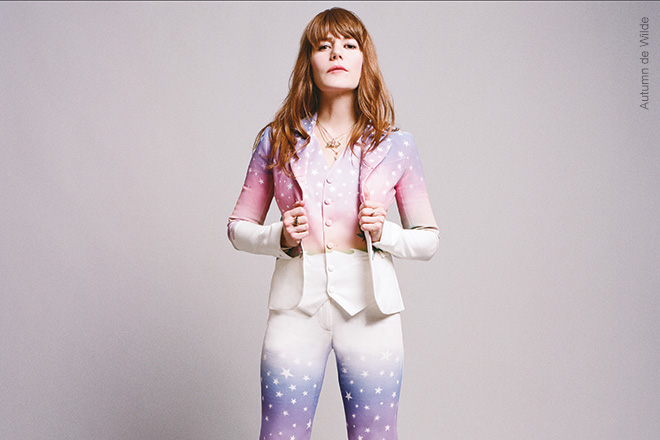JENNY LEWIS
Taking her time pays off for the Rilo Kiley singer on a new solo set
After taking three years to write, record and re-record her third solo album, The Voyager, Jenny Lewis cut the final version in a week and a half with producer Ryan Adams at his Pax-Am Studio in L.A. “Once we started rolling, we just ran through all the songs,” she says. While working on the album, the former Rilo Kiley frontwoman—and half of Jenny and Johnny—stayed busy: She toured with the Postal Service for a year, and scored the film Very Good Girls, starring Dakota Fanning and Elizabeth Olsen. (Olsen performed “Go Ahead”—a Rilo Kiley composition by Lewis—in the film.)
When did you begin the album?
A long time ago—2011. The first song I recorded was “Just One of the Guys” with Beck. I wrote the last song at the end of last year.
How did you connect with Beck?
We’re both from Los Angeles, so I’ve seen him around for years, but I’d never worked with him. I sent him some demos, and he responded to “Just One of the Guys.” But we didn’t finish it. In fact, I didn’t think it was going to make it onto the record. He finished it and sent it to me while I was mixing. Before he sent it, I was like, “Well, he’s a part of the creative process and a muse in a way.” While I was working on “Just One of the Guys,” I started “Late Bloomer.” I had a couple of missing verses, and I wanted to record a version with him. He instructed me to go into the next room and finish the song. Without him I wouldn’t have finished “Late Bloomer.”
Why select Ryan Adams to produce?
I heard he was opening a studio in L.A., on the Sunset Strip. I had a song I was working on in the Keith Richards open tuning. I wanted to just cut that song, but then one song became a whole record. By the end of the day, after we cut “She’s Not Me,” he was like, “Hey man, I think you should recut your whole record here at Pax-Am.”
The record has a polished sound.
That has to do with Ryan. I had very little to do with the arrangements on his sessions. I recorded both Rabbit Fur Coat and Acid Tongue while I was still in a rock band. This is truly my first solo record in that I didn’t have any rules. I wasn’t trying to make anything different from what I already had. I was just trying to serve the songs.
What was it like writing a film score?
That was a challenge. I’ve never thought of myself as an instrumentalist. When I started sending stuff, there was too much music there. The idea of a score is to support what you’re seeing on the screen. I continually had to strip stuff back to its essential elements rather than trying to tell the story that was already being told on screen. I didn’t have money to go into the studio and demo stuff, so I had to record myself on GarageBand playing everything. I somehow had to make that listenable enough for the director and producers to convince them, “This is going to sound good once I actually go in and record it.”
How’d it feel having “Go Ahead” in the film?
It was really fun. Elizabeth and I became friends based on that song. “Go Ahead” was a pretty early arrival for me as a songwriter. It was amazing to have her learn it. That’s the thing about a song: It’s just there for anyone to interpret, whether it’s a movie star like Elizabeth or a kid in her bedroom with an acoustic guitar. A song is something that hopefully lives forever.
–Amanda Farah




comment closed